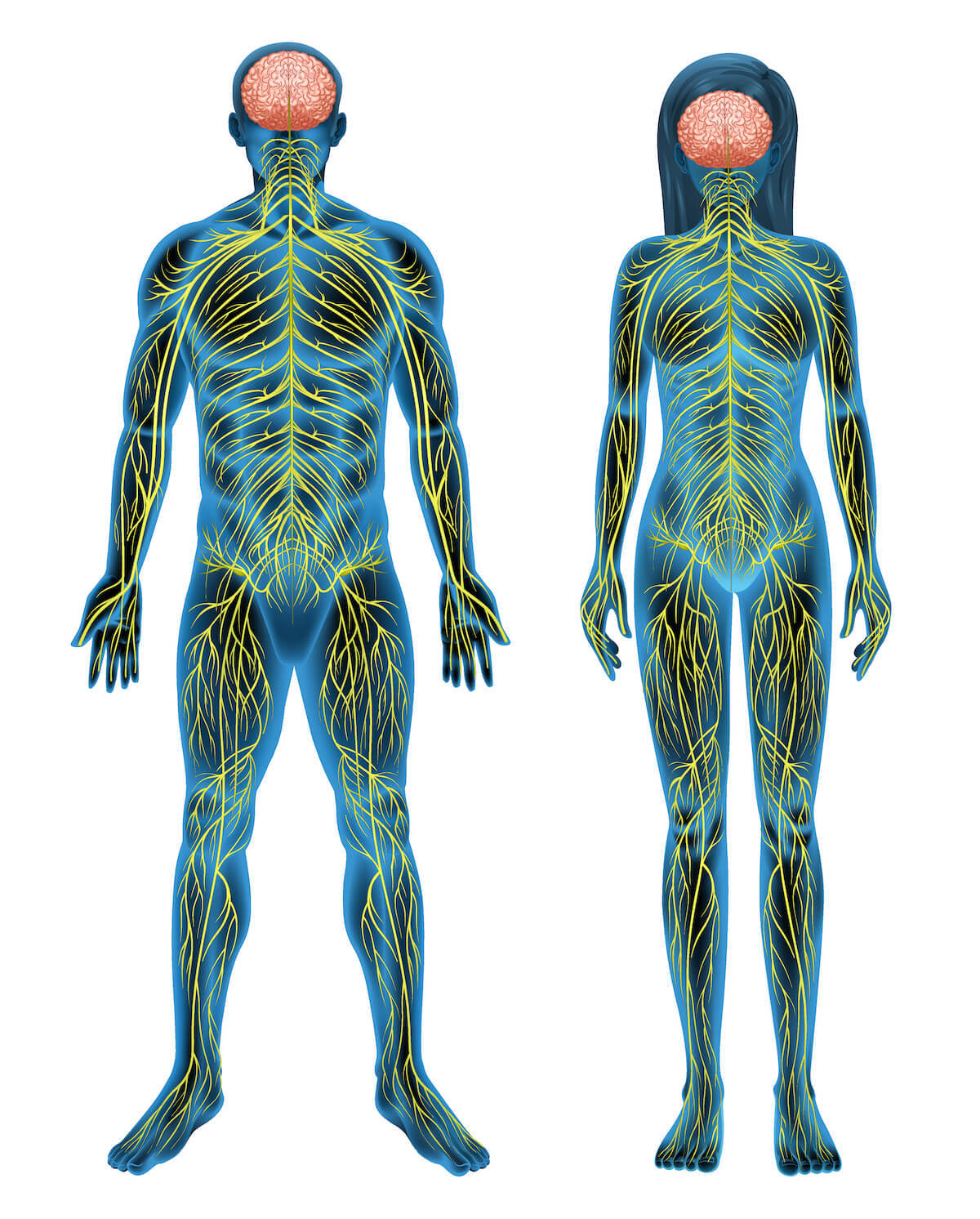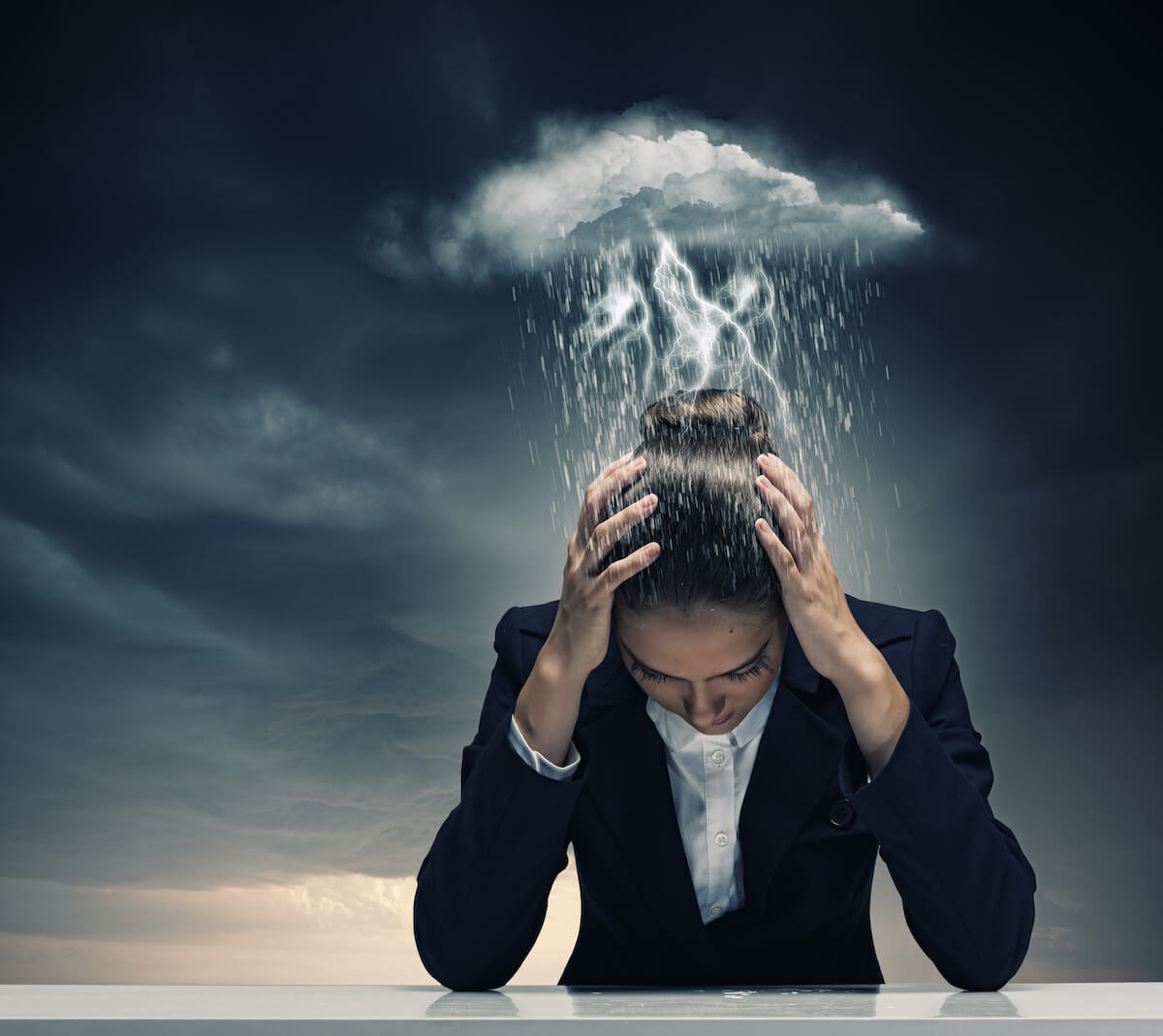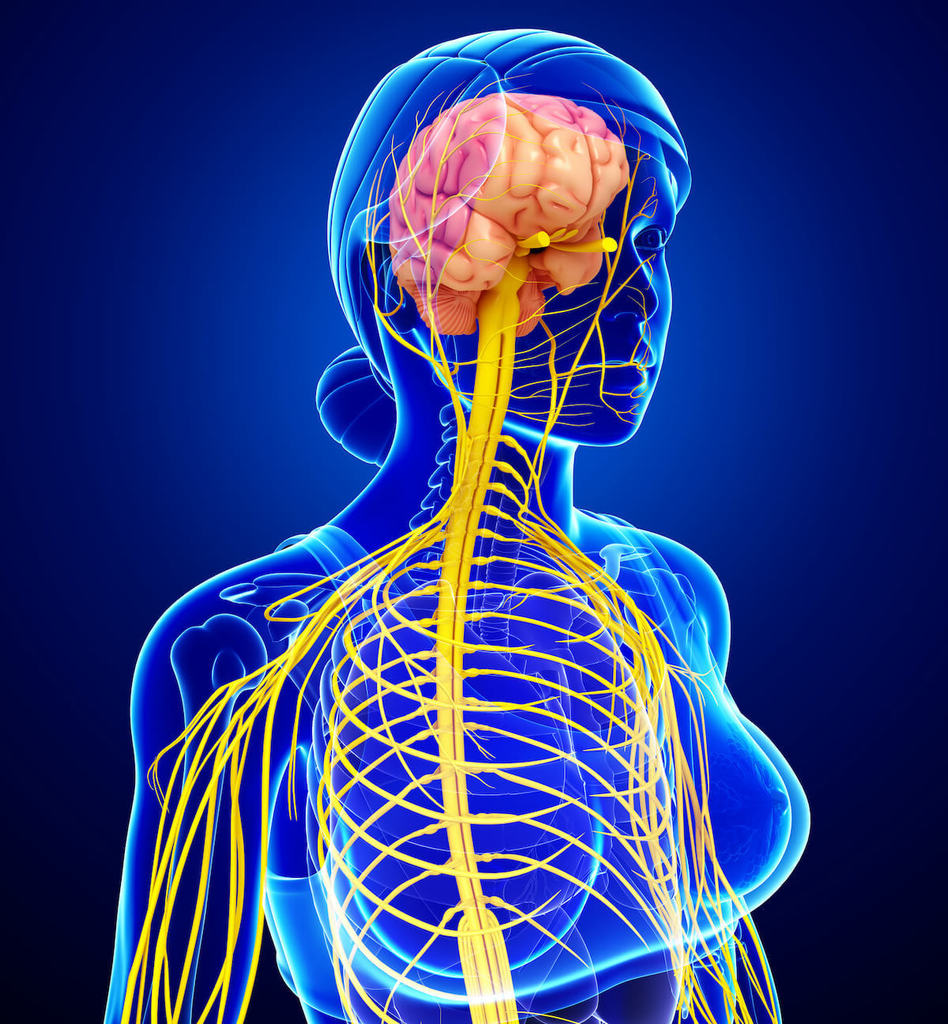Natural relief for anxiety is achievable despite any dark clouds hanging over your head.
The clue to getting rid of anxiety is appreciating that your propensity for anxiety preceded the circumstances you're facing.
That approach changes everything.

Dr. Susan "Shrinklady" LaCombe, Anxiety Coach
Dr. LaCombe is a 20-year veteran Psychologist / Consultant whose passion is leveraging the power of the nervous system for getting rid of the roadblocks to achieving your personal dreams.
Updated: March 20, 2022

Natural relief for anxiety is possible—with the right effort
When folks arrive in my office after upteem visits to their doctor they're understandably upset—not to mention being loaded down with meds.
They haven't received a clear cut answer from their physician. Half the time they wonder if they're making a big deal out of nothing.
"It's all in your head."
How many times have you told yourself that?

Just know . . .
Anxiety is often missed by medical practitioners. Thousands go to their doctors for "other" health conditions that, while similar to anxiety symptoms, are believed to be otherwise. (e.g dizziness is associated with low blood sugar, tightness in the chest with heartburn). [So at some point, it's always good to check with your physician.]
The signs are there . . .
- "I worry and worry about things that later seem unimportant."
- "I go to sleep but my mind won't shut off."
- "My chest is so tight, it sometimes feels as if I can't get a full breath."
- "I've been checking my phone obsessively. I know it's fruitless but I can't stop myself."
No one has explained that these symptoms are a natural outcome of a nervous system that's learned to over-react.
The good news: what has been "learned" can be "unlearned".

By the way, it isn't that people actually tell their physician that they've had an anxiety attack, it's that the symptoms mimic so many other health problems.
The mistaken conclusion is that the attack is related to an organic problem.
For instance, anxiety attack symptoms are often confused with the symptoms of a heart attack.
Indeed, it is sometimes only after several visits to the emergency hospital that the true diagnosis of an anxiety attack becomes confirmed.
And unfortunately, sometimes anxiety is never recognized and the individual continues to believe they are suffering from some strange ailment that the doctors are baffled by. They never receive the proper treatment. Without that clarity, they may even feel victimized by the medical establishment.
The main problem is that anxiety sufferers have been carrying a high charge in their body for sometime—without awareness.
Ask yourself, if you've been living with a charged up body or so long, it's become your "normal".
It makes sense then, that an anxiety attack then appears to arise without warning.
Nervous system dysregulation is the culprit
If your nervous system is dysregulated, it means it's not processing stimulation efficiently.
A healthy nervous system gets triggered by the day's activities and it simultaneously releases that energy. It's either over, or under-reacting, to the challenges that face you.
(Notice that I didn't say "you're" over or under-reacting. It's actually your nervous system that's in charge.)
In order for a nervous system to work well, it can manage stimulation (both stress & excitement) within a window that's tolerable.
It also means your nervous system is resilient. You bounce back.
For instance, imagining coming home after a stressful day. You still have plenty of "room" for a pleasant evening.
You have "room" to live your life. Your nervous system is working as it should.

It's almost inevitable that the charge in your body (also known as your "activation") will increase over time. This is a subtle process and for most people they have little awareness until their symptoms are "shouting" at them.
Let me explain.
Because the nervous system is constantly adapting to new states and the tension in the body easily finds a homeostasis (with each new state becoming the "norm"), inaccurate perceptions are inevitable. Folks miss the fact that their nervous systems have changed.
So even though the body has become more tense and dysregulated, the individual assumes "this is the way I have always been".
An additional irony is that the anxiety sufferer feels more aware with their bodies and the aftereffects are a multitude of sensations that feel strange and uncomfortable.
[Don't get me wrong. They're not imagining these unpleasant sensations. Natural bodily processes even painful ones can seem weird when heightened. But this topic is worth discussing in more depth at a later point.]
Anxiety Attack Symptoms - our survival warning system in action.
Our nervous system evolved over thousands of years. For most of those years humans faced enormous dangers from animals, erratic food supplies, harsh weather conditions, and of course other human beings.
Our brain evolved to respond with lightning speed to any sign of danger, often even before we are even fully conscious of it.

This physical reaction was coined by Walter Cannon as the fight-or-flight response.
So, what accounts for the sudden onset of anxiety attack symptoms?
One of the natural consequences of dysregulation is high activation (i.e. high levels of arousal). Moreover, the ways the nervous system copes with high levels of arousal is through dissociation (i.e. feeling less in one's body).
Dissociation is akin to a somatic numbing and will fluctuate depending upon challenges both internally (i.e. illness, PMS) and externally (i.e. day-to-day stressors). In other words, we can seamlessly move in and out of dissociation on a minute to minute, hour to hour or daily basis. For example, an individual might feel "relaxed" just before "suddenly getting an anxiety attack".
In actual fact, the "relaxed" state was dissociative, an experience that numbs body sensations. As these folks are momentarily (or otherwise) resourced and they move out of dissociation they feel an onslaught of panic and anxiety. This fluctuation can wreak havoc with one's sanity. It's crazy-making!
Not to mention...
With chronic dysregulation they miss the fact that they have been losing touch with the context of their experience, they move into the minimus (ie. living a smaller life). And in fact, they have never been as they are now.
The fear system is powered up by the reptilian brain. Not only can you learn how to control your fears - you can dramatically reduce them - and that means living anxiety-free. To learn more click the link below.
How does your body respond to an anxiety attack?
Your cardiovascular system leaps into action . . .

- Positive arousal chemicals are blocked so that your attention is not distracted by pleasure.
- Your thinking becomes intensely focused on identifying the source of danger even if it is not readily known. Any clue from past experiences is called up from the deep files in the far recesses of the brain.
- Your heart beats hard and fast to pump blood 5X's the normal rate from one gallon to five gallons a minute.
- Blood rushes to the outer extremities in the muscles to enable sufficient strength for fight or flight.
- Blood is constricted in other less essential areas like the surface of your skin (you end up looking quite pale as a result).
- Blood vessels in the kidneys and digestive system also constrict and your mouth becomes dry as a result.
- To lighten the load your bladder or bowels may open up--hence irritable bowel and/or upset stomach.
- Sweat glands open up to cool your body down.
Your respiratory system joins in on the action.
- Your lungs and nostrils open up and your breath speeds up. This allows more air so more blood can be oxygenated, delivering more blood to the muscles. This also gives you the ability to scream loudly!
And behind the scenes...
- Endorphins are released providing a natural pain reliever (sore joints won't limit your strength or speed).
- Our senses sharpen and our pupils dilate. We can even see better in the dark.
- Energy is metabolized. Fat is broken down from the cells and glucose from the liver creates a ready source of energy.
Natural relief of anxiety attack symptoms
is through your nervous system
What many people fail to recognize is that anxiety attack symptoms are actually the result of the normal workings of the autonomic nervous system (ANS). It isn't that the nervous system has gone wacky. It's responding exactly as it should.
The problem is that the set point for danger is too low. Too many events or too much stimulation easily trigger the system into emergency action.
And there's no mystery to why it's set too low...but I will explain that in my next article. (To learn more about the ANS you will find the following articles helpful: Parasympathetic Nervous System and the Sympathetic Nervous System).
"Get rid of anxiety without medication . . . is it really possible?"
YES, you can largely get rid of anxiety without medication by training your brain (ie. by directly accessing your nervous system - the ANS).
*NO, you can never completely get rid of anxiety. You actually need anxiety—it's wired into your brain for protection and survival.
We typically think that only a well-trained yogi or seasoned monk can change the ANS.
Not so.
That said . . .
Remarkably, in some ways your nervous system is like the muscular system. You're familiar with how you can train yourself to follow through on a golf swing, or to use paint brushes with finesse.
Similarly, you can directly access the ANS and with the same amount of focused concentration, you can learn to train your nervous system.
In learning to move through and tolerate what you naturally avoid (ie. the anxiety sensations that show up in your body) you're doing much the same thing as you would in learning any physical skill.
You're learning to tolerate more, to feel less.
In other words, with sufficient practice, the nervous system builds the neuropathways that eventually take care of that angst in the background. You end up feeling less of it.
*Expect to experience anxiety when the situation is dire and calls for it. In our modern lifestyles though, anxiety is rarely required and certainly need not show up for everyday events. That's the kind of anxiety that's possible to get rid of.
Natural relief for the causes of anxiety attacks
The causes of anxiety attacks are rooted in our neurobiology. Anxiety is actually a normal human emotion that enables us to respond to danger in our environment. In short spurts and at the right time, anxiety is a good thing.
When an anxiety attack is triggered, hormones are released so we can respond quickly; in moderation, this helps us survive and to escape threatening situations.
However, if this automatic response is out of proportion to the threat, these emotions interfere with normal functioning and can dramatically affect the quality of our lives.
Even when your anxiety is out of proportion, the nervous system is working as it should. Surprised? Many people are when I tell them this. The problem is that your nervous system has learned to respond this way.
It was the right brain and in particular, the reptilian brain (the right brain includes large parts of the reptilian brain and the limbic system) that learned to respond this way. The reptilian brain is largely in charge of producing anxiety symptoms.

Our nervous system wiring has evolved over thousands of years (similar to the trial and error of building a high performance engine 🙂
And like a high performance engine, it responds well to fine tuning.

Every trauma you ever experienced is recorded by your reptilian brain by raising your level of activation. If you think in terms of everyone buzzing internally at a different frequency then this frequency is called your level of activation. It's a measure of how wound up you are inside.
It's also an internal gauge for how much danger is perceived to be in the environment. How is this so?
Because, for every traumatic event1 we've experienced, the reptilian brain learns that the environment is dangerous. This learning will set the reptilain brain on a higher level of activation. It is currently felt that the earlier and the more traumatic your experiences, the deeper the learning and the higher your level of activation will be.
The higher your activation the more your reptilian brain will be on guard checking for signs of danger, only allowing you to let go when you are safe.
For some people that place of safety is never achieved because the level of activation is too high.
Fear and the Dorsal Vagal Response
When we experience a sharp onset in our fear state Porges suggested that this sudden increase in excitation (or activation as it is often called) propells a compensatory reaction in the nervous system called the "dorsal brake".
The dorsal brake is initiated when high rates of heart beat, breath, blood pressure etc. reach intolerable levels that threaten survival. Most mammals cannot survive this sudden braking system and die as a result (i.e. the freeze response).
Because the human species has a developed cortex, we can use our intelligence to make sense of what just happened (i.e. with a traumatic event). That is of course, if our belief system does not sway us.
In the case of Voodoo Death, the individual's belief system does not provide the necessary meaning that might calm the individual down.
In fact, it is working the other way around. The individual's belief system is creating a fear state that increases a sudden rise in activation. The more dramatic the increase in activation, the more the dorsal brake is likely to come on (this has yet to be confirmed by research however although it might be hard to get subjects for this study).
Nervous system activation and phobias
A dysregulated nervous system is the basis for many of our phobic ('fear') responses. For instance, you don't need a bad experience with an elevator to develop a phobia to elevators. But if you happen to have high activation as the elevator door closes and the enclosed space raises your activation level, you could easily develop a phobic response. Your left brain "problem-solver" erroneously concludes that it was the elevator that posed the danger. [We draw these erroneous conclusions all the time but that's another topic for later.]
What complicates the identification of anxiety attack symptoms is that health problems--for similar reasons--increase the risk that you will trigger your threshold for danger. A health problem--no matter how small--threatens our survival and the higher our activation to begin with, the more we will feel its impact.
Let's say you've developed a bad cold and in the middle of your recovery you have an anxiety attack. It's not that your virus caused the anxiety attack. It was just the last thing your system could take. It "filled you up". It moved your system past your threshold for danger.
You see, it seems that the autonomic nervous system doesn't differentiate an internal threat (i.e. a health problem) from an external threat. This is what clinical practice is revealing. Neurobiologically, it's understandable that anything that makes us vulnerable, intensifies our need for survival.
You may have felt you were doing "fine" before that virus kept you home, and without an alternative explanation for your anxiety attack you might naturally assume it came from the virus. However, it was the virus that caused your nervous system to max out the level of activation. It "filled you up" in much the same way as do traumatic events like car accidents, sudden losses, or bad falls.
Our primitive internal wiring (i.e. our reptilian brain) evolved over thousands of years during which time we existed as cave dwellers roaming the countryside and facing countless dangers. This reptilian part of our brain controls much more of our behaviour than we dare to think. If the nervous system "reads" danger through a high level of activation, we are not in the driver's seat.
In short, we can lower our level of activation. With reduced activation more of our cortical control rests in our hands. You see, it's our cortex (i.e. our cortical control) that calms us down, that tells the primitive brain, "don't worry, I can handle this".
The higher our activation however, the less cortical control we have and the more susceptible we are to the impulsive actions of our primitive brain. In plain English, this means even though I know the elevator isn't dangerous, I can't convince myself otherwise.
Can you get scared to death?
Yes, there are actual recorded deaths by voodoo. Cannon (who coined the term "Voodoo Death") was the first scientist to write seriously about the phenomenon. Cannon reasoned that these deaths by voodoo were the result of over-excitement.
At the time, Cannon was studying mammalian survival strategies. He hypothesized that voodoo death was due to the heightened arousal that get's triggered under extreme fear. This wired in propensity is called the "fight or flight response".
But most people probably know about Voodoo Death because of the James Bond movie about Caribbean Death and Voodoo).
Cannon just about had it right. However, it is now believed that a "wired-in" survival strategy, the freeze response, is the explanation for Voodoo Death.
The fear system and mental health
It's my view that many of our mental health problems are rooted in the fear system (including fears related to our attachment history).
This fear system is based in the lower "reptilian" brain (i.e. brain stem and it's connections to the limbic system where the amygdala is located). Because it lies in the lower brain we don't typically have direct control over it (i.e. getting hungry, sleepy etc.)
But it is our higher brain--the prefrontal cortex--that allows us to ascribe meaning to events and to help calm us down so that we do not die from the freeze or immobility response . . . unless our beliefs are working against us . . . hence Voodoo Death.

"His cheeks blanch, and his eyes become glassy, and the expression of his face becomes horribly distorted. He attempts to shriek but usually the sound chokes in his throat, and all that one might see is froth at his mouth. His body begins to tremble and his muscles twitch involuntarily. He sways backward and falls to the ground, and after a short time he appears to be in a swoon. He finally composes himself, goes to his hut and there frets to death."
R. H. Basedow (1925) The Australian Aboriginal
Cannon assumed that voodoo death was caused by over-activation of the sympathetic nervous system (i.e. like being over-excited).
David Lester, a researcher who later followed up on Cannon's work, proposed another explanation. He suggested that the parasympathetic nervous system was the real culprit. The parasympathetic nervous system as you may know calms down the nervous system when we're ready to relax. This is known as the relaxation response, or what somatic practitioners refer to as the ventral vagal response.
Stephen Porges elaborated on his theory by explaining that it isn't the ventral vagal response that's at work in Voodoo Death. Porges uncovered another branch of the parasympathetic nervous system called the dorsal vagal branch which is triggered when we become overwhelmed.
BTW, his discovery of the dorsal branch has opened up a whole new area of study that sheds light on depression, PTSD, illness (Scaer, 2005) and even joy.
My Personal Musings
Do problems such as "fainting" and "nose bleeds" (possible evidence of the dorsal brake) appear more often in clients seeking therapy for anxiety, depression and PTSD? Is Porges' theory an explanation for them? Just possible. I've certainly seen a reduction in fainting episodes and nosebleeds in my practice as the nervous system becomes more regulated.
Somatic therapists are certainly rejoicing. Porges' theory explains what we see in our clinical practices. When you reduce fear in the nervous system, so called "pathology" disappears. This is a generalization but I continue to be amazed at the power of the somatic approach to anxiety, depression and issues related to developmental gaps (which pretty much covers it!).
How do you reset your level of activation?
You can get natural relief from anxiety attacks by facing into the angst you avoid as revealed somatically (ie. in your body). In this way, you begin to train your brain.
Mind you, it's necessary to do that in small doses. (Sorry for the plug - that's the baby step method described elsewhere and in my Program - DeCoding the Brain for Anxiety Blues.)
Want faster results. Simply stated, you reset it via a safe connection with another human being, that is, another nervous system.
If that connection includes right brain awareness of emotions and body sensations your recovery will be that much faster. For many people this is accomplished in psychotherapy within the therapeutic relationship with their therapist.
Notes
1. I like Dr. Scaer's definition of trauma. He suggest that an event is "traumatic" when it overwhelms the capactiy of the nervous system to handle. In other words, facing trauma is something we humans cannot avoid as we move through life.
References
Levine, Peter, A. (1997). Waking the Tiger: Healing Trauma. Berkeley, California: North Atlantic Books.
Cannon, W.B. (1942) "Voodoo" death. American Anthropologist, 44: 169.
Lester, David, Voodoo Death: Some new thoughts on an old phenomenon. American Anthropolgist, New Series, Vol. 74, No. 3 (Jun., 1972), pp. 386-390.
Porges, Stephen, (1995). Orienting in a defensive world: Mammalian modification of our eveolutionary heritage. A polyvagal theory. Psychophysiology, 32, 301-318.
Stephen Porges' identified two, not one, branch of the parasympathetic nervous system. His discovery of the dorsal vagal (and its relationship to the ventral vagal) has helped us to understand the freeze response and its relationship to voodoo death and PTSD. The polyvagal theory has also been useful in understanding the mind body connection. You can access his classic 1995 article here (you will be taken off site:
Orienting in a Defensive World...A Polyvagal Theory.
Scaer, Robert, C., (2005). The Trauma Spectrum, New York: W. W. Norton & Company.


15